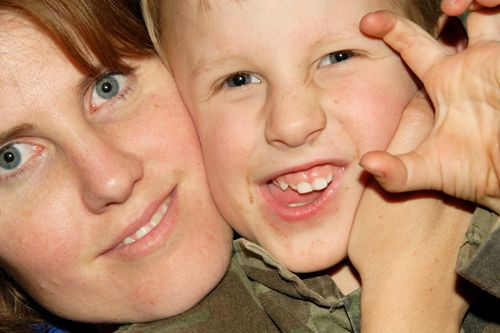An Unlikely Source Of HPV Vaccine For Boys: Their Mothers

Sons are much more likely to receive the HPV vaccine if their mothers receive preventive care for other diseases. A new study from Kaiser Permanente found that more boys get the vaccine for the sexually transmitted infection (STI) human papillomavirus (HPV) if their mothers visited the doctor for flu shots and pap smears.
"Given that vaccination offers an opportunity to achieve community immunity and reduce transmission of HPV, understanding a mother's health-seeking behaviors may help health care professionals develop strategies for increasing vaccination rates among adolescent boys," said lead author Dr. Rulin Hechter, a vaccine specialist at Kaiser Permanente Southern California.
HPV is the most common STI in America, and it is estimated that nearly everyone who is sexually active will get at least one version of the virus in their lifetimes, according to the U.S. Centers for Disease Control and Prevention (CDC). It is also a major cause of cancer in women — cervical, vaginal, vulvar — with nearly 21,000 cases per year.
When the HPV vaccine was originally approved in 2007, it was only pushed for use with women, but follow-up studies highlighted a need for men to receive the preventive treatment too.
The virus is linked to nearly 12,000 new cases of cancer — penile, anal, and throat — per year. Given that men often don't show any symptoms of infections, the vaccine offers a way for reducing transmission within the population, while also having the added benefit of preventing the development of uncomfortable genital warts in both sexes.
In 2009, the CDC officially released a set of revised recommendations that included the vaccination of boys and young men, which could have an extra benefit for gay communities.
However, research suggests compliance has been low, with one investigation citing as few as two percent of male adolescents receiving the drug.
Mothers And Sons
By analyzing the electronic medical records of 250,000 boys between the ages of nine to 14 years old, Hechter and her colleagues found interesting trends between adolescent males who were vaccinated between October 2009 and December 2010 and mothers seeking preventative care for diseases unrelated to HPV.
The HPV vaccication rate was 16 percent higher for boys whose mothers had received a flu shot within this year versus boys whose mothers had not. Pap screening for moms also lead to a 13-percent vaccination boost for teenage boys.
For mothers who did have a history of genital warts, the trend was even stronger, with boys being 47 percent more likely to be treated.
"Our study findings suggest that a mother's receipt of preventive services may have an impact on their son's HPV4 vaccination," said Hechter. "These mothers might be more familiar with preventive measures for HPV infection, influencing their decision to have their children vaccinated."
Source: Hechter RC, Chao C, Sy LS, et al. Quadrivalent Human Papillomavirus Vaccine Uptake in Adolescent Boys and Maternal Utilization of Preventive Care and History of Sexually Transmitted Infections. American Journal of Public Health. 2013.
Published by Medicaldaily.com



























